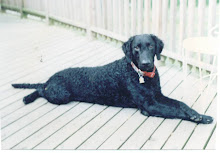Deacon, my Curly-Coated Retriever, has a very soft mouth. Since he was not actively field training, I might have missed this fact except for an incident that happened one spring morning.
Every morning the dogs run outside in a fenced back yard then come in and hang out with me for awhile before I have to go to work. One morning, after the dogs had been back inside for about half an hour I noticed that unmistakable look on Deacon's face and knew that he was hiding something in his mouth. You know the look, the cheeks kind of puff out and it's the only time that he isn't under foot.
Fearing the worst, I stuck out my hand and said "Give!". He hesitated for a few moments then moved to give me his prize. Very gently, he placed an object in my hand. . . a bird. . . a baby bird . . . a tiny, featherless baby bird. . . that was now opening and closing its mouth waiting for "mama" to provide the next meal. The baby bird had been comfortably hiding in his mouth for half an hour.
I didn't have the heart to tell Mama Deacon that his baby would not survive. . . it was too young to survive without a real mother bird. We went out and looked for a nest but there was none to be found. We left the baby where its mother could find it if she was looking for it and went back inside.
Also see: Soft Mouth; Can You Train It posted on this blog on 01/17/2010.
Q & A for the Day:
So, what is a soft mouth in retriever lingo?
The dog must have a firm grip to hold a bird, from a small dove to a large goose. The soft mouth is best evidenced by what the dog delivers to you. . . a bird without teeth marks or crush injuries (from the dog's jaw). A soft mouth is evidenced by a firm hold with no chewing or chomping. The bird has usually been shot so there will be blood, but the retriever should not be enticed by the blood to determine that the bird should become his own dinner (yes, it happens). There is some confusion with this point, though, because a soft mouthed dog can also decide to eat the bird, but that is usually a training issue.
A well trained retriever is a great conservation tool. Hunters who take their daily limit without a good retriever (human or canine :-) have probably left several dead birds at the hunt site because they couldn't reach or find them. A good hunting dog will retrieve every bird that falls so there are no unnecessary kills required to meet the limit.
For those hunters that "kill" more than the legal limit so they can leave with a limit. . . shame on them. Every bird down counts. If they want to take them all home, they should get a good 'huntin dawg'.
Hunter

A true gentleman
Subscribe to:
Post Comments (Atom)










3 comments:
What a sweet story of your soft mouthed dog!! Now I have a question regarding "soft mouths" that you may be able to answer. I have a chocolate lab that won't put anything in her mouth (except food). She doesn't pick up or play with a ball, picks bones or treats off the floor but won't catch if they are tossed at her, won't even catch a piece of popcorn! We, of course, wanted her for a bird dog and only once have we ever seen her with a duck in her mouth - I think she forgot who she was for a moment! Is there a way to "help" her enjoy the fun of fetching and catching? Thanks, Teri WA State
I have sent you an email. Please post your training results here.
Good luck.
Our Golden Retriever frequently did things like this. We have rescued both birds and mice from Winnie der Pooh's mouth with no visible injury to the caught animal. With one bird, we put him on the shed roof and when his wings dried out, he flew away. We put the mouse on the deck and when we checked 30 minutes later, he too was gone. With another mouse, she flip him into the air and would run and catch him.
Post a Comment